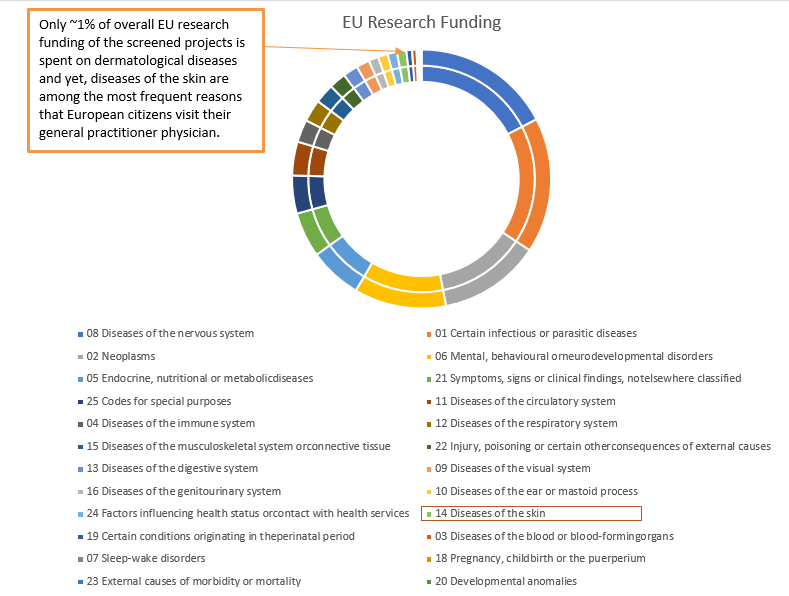On January 17, the European Commission published a Discussion Paper entitled, “Scoping study on evidence to tackle high-burden under-researched medical conditions”. GlobalSkin along with our Members had an opportunity to input into this study.
“Skin and sub-cutaneous diseases” was identified as one of the 12 therapeutic areas defined as high-burden and under-researched. And the following diseases (all of which we represent) were specifically named within that therapeutic area: Dermatitis; Hidradenitis Suppurativa; Genital Lichen Sclerosus; Lichen Planus.
The study highlights that diseases of the skin are among the most frequent reasons that European citizens visit their general practitioner physician, however their diseases are only receiving ~1% of overall funding in the EU dedicated to diseases research! This stark reality is leaving many patients with very high physical, psychological, financial, and life responsibilities burdens. Investing in research will significantly contribute to meeting unmet needs, including, as the study’s findings point out, stimulating the creation of large research networks and creating more/better national, EU, and international funding opportunities.
The Discussion Paper states the need to quantify disease impact on individuals. GlobalSkin’s ground-breaking new Patient-Reported Impact of Dermatological Diseases (PRIDD) measure is well positioned to generate this type of data on all dermatological conditions, including those prioritized by the European Commission in this paper. GlobalSkin in collaboration with researchers at Cardiff University (UK) and University Medical Centre Hamburg-Eppendorf (Germany) will launch the Global Research on the Impact of Dermatological Diseases (GRIDD) Study in June 2023 to capture this patient impact data about what it is like to live with a dermatological condition.
"As a patient advocate, reading the European Commission’s discussion paper was a validation of what GlobalSkin and its more than 200 dermatology patient organization members around the world already knew but could not qualify – that skin diseases are highly impactful and under-prioritized in health care systems and research agendas. The rigor behind this scoping study is noteworthy as it finally provides our community with irrefutable proof that significantly more time and money must be invested into health research that leads to faster diagnosis, better treatments, more cures, and improved primary and specialist care." Jennifer Austin, GlobalSkin, Chief Executive Officer
A stakeholder survey conducted for this study resulted in participants indicating the following requirements to increase research activity for dermatological diseases:
- Stimulate the creation of large research networks
- Create more/better national, EU, and international funding opportunities
- Stimulate researcher mobility
- Make incentives sufficiently accessible to do research on these medical conditions
- Increase incentives (other than financial) to do research on these medical conditions
- Stimulate the organisation of specific conferences in the medical areas
GlobalSkin welcomes opportunities to inject the patient voice into projects related to these under-researched medical conditions and is following up with the European Commission and the research community to actively engage with its patient organizations from across Europe.





